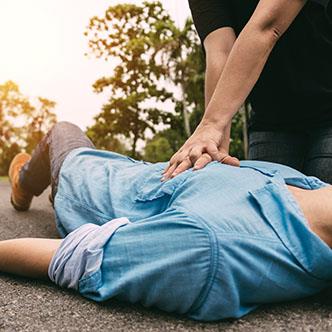
CPR (cardiopulmonary resuscitation) is critical when someone’s heart suddenly stops beating during cardiac arrest, especially if they’re gasping for air, based on a recent study linking the body’s natural gasping reflex to increased odds of survival.
Published in the Journal of the American College of Cardiology, this study looked at the association between gasping and one-year survival after cardiac arrest. Gasping is a natural reflex that occurs when the body attempts to breathe after the heart stops beating. Gasping can be misleading to bystanders considering CPR, as it may be mistaken for normal breathing and delay resuscitation. However, recent findings suggest immediate CPR is especially important in those gasping for air, as they’re more likely to survive cardiac arrest.
Conducted at 46 U.S. medical centers, this study included more than 1,800 adults suffering cardiac arrest between 2007 and 2009. All participants experienced cardiac arrest out of the hospital and received CPR by emergency medical personnel for at least one minute.
Overall, 5% of patients survived with favorable brain function after one year and case reports showed that nearly half of patients experienced spontaneous gasping during cardiac arrest.
After analysis, researchers found that adults gasping during CPR were four times as likely to survive as those without signs of gasping. Researchers also note that younger age and receiving CPR for a longer period of time were also associated with increased survival.
As authors explain, findings highlight the importance of continuing CPR in patients that may be gasping during cardiac arrest. When someone suffers cardiac arrest outside of the hospital, CPR can help keep a person alive until medical personnel arrive. It’s important that bystanders don’t mistake gasping for normal breathing, as CPR is still needed to boost the person’s chance of survival.
To learn more about CPR and how to find a course near you, read our CPR Fact Sheet.